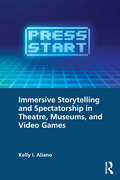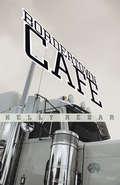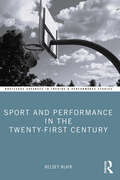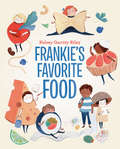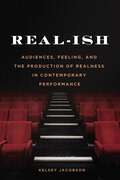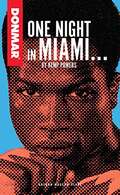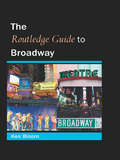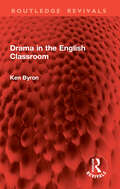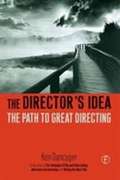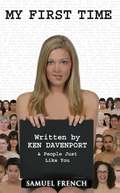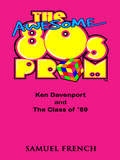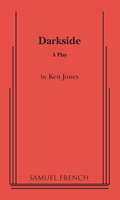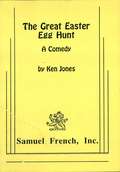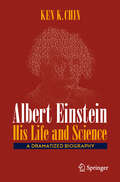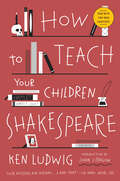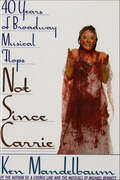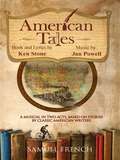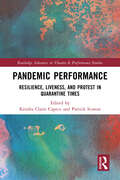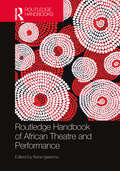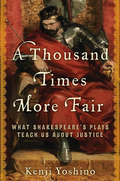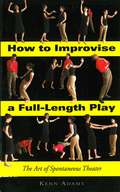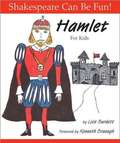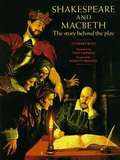- Table View
- List View
Immersive Storytelling and Spectatorship in Theatre, Museums, and Video Games
by Kelly I. AlianoImmersive Storytelling and Spectatorship in Theatre, Museums, and Video Games is the first volume to explore immersion as it is experienced in all three of these storytelling forms: the theatre, museums and historic sites, and video games. It theorizes what it means for a work to be called immersive and how immersion impacts audience experience in each of these modes.The presentation of story is deepened when it involves the spectator in an immersive way. Author Kelly I. Aliano concentrates on the central idea that the use of immersion in each medium allows the story being told to feel present for the spectator. It puts them at the center of the experience, making its events for and about them. Throughout, the book discusses how immersion is employed to make narrative feel more resonant and relevant for the audience. Analyzing the impact of offering a first-hand experience of story events, this book looks at how immersive storytelling can highlight the ways in which we can interact with and shape our understandings of ourselves and our society as well as our histories and identities.Ideal for students, scholars, and researchers of immersive theatre, spectatorship, museum studies, and video game studies, this is an innovative study into the power of immersive storytelling across three interactive mediums.
Bordertown Café
by Kelly RebarSeventeen-year-old Jimmy faces the archetypal Canadian dilemma: stay home in Canada, with all its obvious flaws, or go south (young man) to the Land of Opportunity. Should he stay with his mother at the Bordertown Café or haul off with his trucker father? Family history is the border's story writ large. Cast of 2 women and 2 men.
Sport and Performance in the Twenty-First Century (Routledge Advances in Theatre & Performance Studies)
by Kelsey BlairAnalyzing sport through the lens of performance and theorizing performance through the lens of sport, Sport and Performance in the Twenty-First Century offers a field intervention, a series of in-depth performance analyses, and an investigation of the intersection between sport performances and public life in the historical present in the global north. The objectives of this book are three-fold. First, the book advocates for the study of sport in the fields of Theatre and Performance Studies and, through in-depth performance analyses, demonstrates how the critical language and methods of performance studies help illuminate the manifold impacts of the practices, activities, and events of sport. Second, the book introduces new critical language that was originally developed in conjunction with sport but is also designed for cross-genre performance analysis. In introducing novel terminology, the book aims to simultaneously facilitate analysis of sport performances and to demonstrate how the study of sport can contribute to the fields of Theatre and Performance Studies. Finally, the book investigates the epistemological, affective, and socio-political effects of sport performances in order to illuminate how sport performances influence, and are influenced by, their historical conditions. This study will be of great interest to students and scholars in Theatre and Performance Studies, Physical Culture Studies, and Socio-Cultural Sports Studies.
Frankie's Favorite Food
by Kelsey Garrity-RileyA scrumptiously adorable story about a boy, a school play and his love for food. Featuring foods from all over the world, this debut picture book will make you hungry for more!Frankie has a problem: he has too many favorite foods. He can't bring himself to choose just one to be for the school play, so on the day of the performance, he's still without a costume. His teacher comes up with a delicious idea: what if Frankie becomes the Costume Manager? That way, he can parlay his love of all things culinary into the whole production. From adding some last-minute garnishes to helping the rice and beans into their costumes, Frankie shines backstage until he has a brilliant idea and decides to make his debut on the menu as something that combines his love for all his favorite foods . . .In this funny and scrumptiously adorable story, readers will delight in the variety of foods represented and the clever performances full of silly word play and sweet camaraderie. In Kelsey Garrity-Riley's author-illustrator debut, she shows the joy of food and revels in celebrating the way food can bring people together and inspire creativity.
Real-ish: Audiences, Feeling, and the Production of Realness in Contemporary Performance
by Kelsey JacobsonIn the “post-truth” era, the question of how people perceive things to be real, even when they are not based in fact, preoccupies us. Lessons learned in the theatre – about how emotion and affect produce an experience of realness – are more relevant than ever.Real-ish draws on extensive interviews with audience members about their perceptions of realness in documentary, participatory, historical, and immersive performances. In studying these forms that make up the theatre of the real, Kelsey Jacobson considers how theatrical experiences of realness not only exist as a product of their real-world source material but can also unfurl as real products in their own right. Using the concept of real-ish-ness – which captures the complex feeling that is generated by engaging with elements of reality – the book examines how audiences experience the apparently real within the time and space of a performance, and how it is closely tied to the immediacy and intimacy experienced in relation to others.When feeling – rather than fact –becomes a way of knowing truths about the world, understanding the cultivation and circulation of such feelings of realness is paramount. In exploring this process, Real-ish centres audience voices and, perhaps most importantly, audience feelings during performance.
One Night in Miami… (Modern Classics Series)
by Kemp PowersBefore they were icons they were friends. <p><p> The world would come to know him as Muhammad Ali, but on 25 February 1964, a twenty-two-year-old Cassius Clay celebrated his world heavyweight title not by hitting the town, but in a hotel room with his three closest friends: activist Malcolm X, singer Sam Cooke and American football star Jim Brown. To the outside world, they were American icons. But in that hotel room, here were four men who understood each other and their moment in history in a way that no one else could. With the Civil Rights movement stirring outside, and the melody of A Change is Gonna Come hanging in the air, these men would emerge from that room ready to define a new world. <p><p> Kemp Powers's tough talking, in-your-face debut play premiered in LA in 2013 where it won the Ted Schmitt Award for outstanding world premiere of a new play along with three LA Drama Critics Circle Awards, four NAACP Theatre Awards and LA Weekly Theater Awards for playwriting. <p><p> This edition was originally published to coincide with the European premiere at London's Donmar Warehouse in 2016 where it received critical acclaim. It was later adapted into a feature film, released in January 2021.
Routledge Guide to Broadway
by Ken BloomThe Routledge Guide to Broadway is the second title in our new student reference series. It will introduce the student to the Broadway theater, focusing on key performers, writers, directors, plays, and musicals, along with the theaters themselves, key awards, and the folklore of Broadway.Broadway is the center of American theater, where all the great plays and musicals make their mark. Students across the country in theater history, performance, and direction/production look to Broadway for their inspiration. While there are illustrated coffee table type books on Broadway, there are few that offer a comprehensive look at the key figures and productions of the last two centuries. The Routledge Guide to Broadway offers this information in an easy-to-use, inexpensive format that will appeal to students, professors, and theatrical professionals.
Drama in the English Classroom (Routledge Revivals)
by Ken ByronFirst published in 1986, Drama in the English Classroom demonstrates the contribution of drama in an English classroom. It suggests that drama activities, language work, and the reading of fiction can all enrich each other in ways which promote the aims of the English teacher.The author draws on his own classroom experience and on that of the teachers whom he guided (on long-term in-service work) through the process of learning to use drama effectively. He offers many examples to illustrate the opportunities and the problems of using drama in English. Planning, key drama strategies, major pitfalls, evaluation, and the rewards of drama are examined from the viewpoint of an English teacher who senses that drama has a great deal to offer in the classroom but is at first unsure of what and how. As major part of his book is presented in form of a teacher’s journal, we see the author trying things, reflecting on the result, talking to a more experienced colleague, and steadily finding out what drama can contribute and how he can achieve this in his teaching. This book is an encouraging and helpful guide for anyone who wishes to use drama effectively but is unsure of the first steps.
The Director’s Idea: The Path to Great Directing
by Ken Dancyger<i>The Director’s Idea</i> is a book that comes out of Ken Dancyger's teaching experience with production students at New York University and with professional producers and editors at the Maurits Binger Institute in Amsterdam. Provides an articulation of the storytelling tools of the director. This is a book about directing for directors and talented individuals who want to become directors.
My First Time
by Ken DavenportComedy / Characters: 2m, 2f / Set: Simple Set "I remember my first sexual experience. I was alone at the time!” (Story #6509)“I still have the Metallica shirt he wore that night.” (Story #23960)“File mine under clumsy and awkward!” (Story #4294)My First Time features four actors in hysterical and heartbreaking stories about first sexual experiences written by real people. In 1998, a decade before blogging began, a website was created that allowed people to anonymously share their own true stories about their First Times. The website became an instant phenomenon as over 40,000 stories poured in from around the globe that were silly, sweet, absurd, funny, heterosexual, homosexual, shy, sexy and everything in between. And now, these true stories and all of the unique characters in them are brought to life by four actors in this acclaimed 90 minute play from Ken Davenport, producer of Altar Boyz and creator of The Awesome 80s Prom. "Funny and touching to sweet, sexy and silly!"- The Village Voice "One of New York's best new plays! Phenomenal!" -EdgeNewYork.com
The Awesome 80's Prom
by Ken Davenport11m, 8f / Comedy, Audience Participation/Interactive / Unit Set The Awesome 80s Prom is a brand new blast-from-the-past party in the style of Tony 'n Tina's Wedding and The Donkey Show set at Wanaget High's Senior Prom... in 1989! All your favorite characters from your favorite '80s movies are at THE PROM, from the Captain of the Football Team to the Asian Exchange Student, from the Geek to the hottie Head Cheerleader, and they're all competing for Prom King and Queen. And just like on "American Idol", the audience decides who wins! Come back in time and join the breakdance circle or just sit back and watch the '80s drama unfold. WINNER! 2006 IMPROV THEATER AWARD - "BEST INTERACTIVE SHOW"
Darkside
by Ken JonesDrama / 3m, 2f / Two American astronauts are stranded in a lunar landing module on the dark side of the moon while a third orbits in the command module. As they work with ground control toward rescue, flashbacks reveal their stories.
The Great Easter Egg Hunt
by Ken JonesComedy / 9m, 6f / Exterior / This comedy centers around an Annual Easter Egg Hunt. Citizens vie for the ultimate prize attainable in Umatilla, Florida the Golden Egg. Meanwhile Horseshoe and Clem Dumpling seek to avenge their shattered hopes of married bliss, the town flirt chases every man except for the one who is in love with her and two young lovers struggle to escape this small town. Judge Pulander officiates, but is soon overwhelmed by apple and cypress bark cider. The Rifle Association initiates a blood feud while the Women's Club fans the fire with gossip. The Great Easter Egg Hunt is a comic journey through one day in an isolated town that reflects the greed, cowardice, regret, avarice, love, stupidity, hope, passion and drama of life in America.
Albert Einstein – His Life and Science: A Dramatized Biography
by Ken K. ChinThis book is part biographical account, part novel, and part popular science. The basic facts are historically true, but many episodes have additionally been dramatized with plausible content that brings the personal story to life in the style of a novel or movie script. This genre of a “dramatized biography" of scientists was first created by the author 45 years ago and became a great success selling over half a million copies in China, where it has been in particular demand for teaching. But this is not the whole story: In addition, the book explains, in a serious yet accessible manner, the basics of Einstein’s scientific work, especially its impact on contemporary cosmology, astronomy, and physics. As an experienced teacher of relativity and astronomy for high-school and university students, the author knows how to make profound scientific subjects accessible, and his presentation is as fascinating as a detective story. Readers will learn not only about the historical setting but also about the challenges and frustrations faced by Einstein, about his breakthroughs and triumphs, as well as the far-reaching significance of his theory of relativity, quantum mechanics, and other scientific achievements. The reader will come to understand why, of all the billions of people living in the twentieth century, Albert Einstein was singled out as the “Person of the Century.”
How to Teach Your Children Shakespeare
by Ken LudwigA foolproof, enormously fun method of teaching your children the classic works of William Shakespeare, by a Tony Award–winning playwright—now featuring two new chapters &“You and your children will be transformed by the magic and mystery of Shakespeare and his stories in an instant.&”—Sir Derek Jacobi, CBE Winner of the Falstaff Award for Best Shakespeare BookTo know some Shakespeare provides a head start in life. His plays are among the great bedrocks of Western civilization and contain the finest writing of the past 450 years. Many of the best novels, plays, poems, and films in the English language produced since Shakespeare&’s death in 1616—from Pride and Prejudice to The Godfather—are heavily influenced by Shakespeare&’s stories, characters, language, and themes. In How to Teach Your Children Shakespeare, acclaimed playwright Ken Ludwig provides the tools you need to inspire an understanding, and a love, of Shakespeare&’s works in your children, and to have fun together along the way.Ken Ludwig devised his friendly, easy-to-master methods while teaching his own children. Beginning with memorizing short passages from the plays, his technique then instills children with cultural references they will utilize for years to come. Ludwig&’s approach includes understanding of the time period and implications of Shakespeare&’s diction as well as the invaluable lessons behind his words and stories. Colorfully incorporating the history of Shakespearean theater and society, How to Teach Your Children Shakespeare guides readers on an informed and adventurous journey through the world in which the Bard wrote.This book&’s simple process allows anyone to impart to children the wisdom of plays like A Midsummer Night&’s Dream, Twelfth Night, Macbeth, and Romeo and Juliet. And there&’s fun to be had throughout. Shakespeare novices and experts and readers of all ages will each find something delightfully irresistible in How to Teach Your Children Shakespeare.
Not Since Carrie: 40 Years of Broadway Musical Flops
by Ken MandelbaumNot Since Carrie is Ken Mandelbaum's brilliant survey of Broadway's biggest flops. This highly readable and entertaining book highlights almost 200 musicals created between 1950 and 1990, framed around the notorious musical adaptation of Carrie, and examines the reasons for their failure. "Essential and hilarious," raves The New Yorker, and The New York Times calls the book "A must-read."
Not Since Carrie: Forty Years of Broadway Musical Flops
by Ken MandelbaumIf you love Broadway musicals, this book is for you. While Broadway has had its share of musical triumphs, it has also seen hundreds of musicals that had brief runs, lost millions of dollars, and broke the hearts of their creators and performers. For every hit musical, there are roughly five others that are quick flops, and even the most celebrated names in show business are not immune to them. Ken Mandelbaum offers the behind-the-scenes story of the development of almost two hundred musical flops that played Broadway between 1950 and 1990, along with a reevaluative and often revisionist study of their quality. Here they all are, from such legendary catastrophes as Carrie, Kelly, Breakfast at Tiffany’s, and Legs Diamond, to flops that starred Lucille Ball and Bette Davis, to the failures of Rodgers and Hammerstein, Jule Styne, Jerry Herman, Alan Jay Lerner, Gower Champion, and many others. Not Since Carrie makes a case for the strengths of certain unsuccessful works, points out some that might be worthy of revival, and allows the reader to relive some of Broadway’s most infamous moments. A reexamination of neglected, forgotten, and often catastrophic musicals, Not Since Carrie will remain the definitive volume on a colorful and vital segment of "lost” theatre history. Ken Mandelbaum has written on musical theatre for The New York Times, Playbill, Stagebill, Billboard, Show Music, and Sony/Columbia Records. He is currently the musical theatre critic for Theater Week magazine. In 1989, he won acclaim for his first book, A Chorus Line and the Musicals of Michael Bennett (St. Martin’s Press). He lives in New York City, and his favorite song is "I Wish It So” from the flop Juno. If you subscribe to a music service like Amazon or Spotify, you can listen to many of the songs described. At the end of the book there is a Shows Index and a Names Index.
American Tales
by Ken Stone4m, 1f / Running Time: 90 minutes plus intermission / Period costumes and set pieces, mid to late 19th century / Act I, The Loves of Alonzo Fitz Clarence and Rosannah Ethelton, is from Mark Twain's story of two people falling in love at a great distance with the aid of that brand-new invention, the telephone. Alonzo in Maine and Rosannah in California meet by the accident of crossed wires and each falls in love with an imagined ideal of the other. So complete is their self-deception that even when brought face to face they cannot recognize each other. Love is found, lost, and found again. Played as period melodrama, but the relevance to 21st century dating habits is clear. Act II, Bartleby, the Scrivener, is dramatized from Herman Melville's slyly funny but ultimately tragic story. Building on the theme of human connections made and missed, this act takes a darker turn, looking at people who occupy the closest of quarters and yet don't really communicate at all. Bartleby, employed as a copyist in a law office of the 1840s, inexplicably begins to refuse to work, forcing his colleagues to ask themselves the transforming question that ends the play: What do we owe to the people who come into our lives? "Excellent new musical." - Critic's Choice, LA Times
Pandemic Performance: Resilience, Liveness, and Protest in Quarantine Times (Routledge Advances in Theatre & Performance Studies)
by Kendra Claire CapecePandemic Performance chronicles the many ways that people are surviving/thriving through performance in a global pandemic. Covering artists and events from across the United States: from New York to California and from South Dakota to Texas, the chapters are equal parts theory and practice, weaving scholarship with personal experience from contributors who are interdisciplinary artists, scholars, journalists, and community organizers providing unique and invaluable perspectives on the complicated work of resilience during COVID-19. This study will hold interest for students and scholars in the performing arts, arts, and social justice as well as professional artmakers and creative community organizers.
In The Pines: Columbia River Book 3
by Kendra ElliotClues to a hidden treasure. Clues to a family secret. Both lead to murder in a twisting novel of suspense by Amazon Charts and Wall Street Journal bestselling author Kendra Elliot. A national treasure hunt with a $2 million prize has driven obsessed fortune seekers to overrun the small town of Eagle’s Nest, Oregon. The hunt’s cryptic clues and the lure of wealth have exposed the desperate side of human greed: theft, fights, trespassing—and even the motive to kill. Police chief Truman Daly craves peace in his town but has a murder on his hands instead. Now the big prize isn’t the only thing hiding in the pines. So is a killer. When a young boy walks into the local café and claims his mother and baby sister have been missing for weeks, FBI special agent Mercy Kilpatrick investigates and exposes a disturbing twist in his story. Deep family secrets and lies that started sixty years ago have burst into the present, bringing with them deadly consequences. Mercy’s and Truman’s investigations lead down a path of murder, revenge, and buried secrets to uncover two intertwined mysteries as dark as an Oregon forest.
Routledge Handbook of African Theatre and Performance (Routledge International Handbooks)
by Kene IgweonuThe Routledge Handbook of African Theatre and Performance brings together the very latest international research on the performing arts across the continent and the diaspora into one expansive and wide-ranging collection.The book offers readers a compelling journey through the different ideas, people and practices that have shaped African theatre and performance, from pre-colonial and colonial times, right through to the 20th and early 21st centuries. Resolutely Pan-African and inter- national in its coverage, the book draws on the expertise of a wide range of Africanist scholars, and also showcases the voices of performers and theatre practitioners working on the cutting-edge of African theatre and performance practice. Contributors aim to answer some of the big questions about the content (nature, form) and context (processes, practice) of theatre, whilst also painting a pluralistic and complex picture of the diversity of cultural, political and artistic exigencies across the continent. Covering a broad range of themes including postcolonialism, transnationalism, interculturalism, Afropolitanism, development and the diaspora, the handbook concludes by projecting possible future directions for African theatre and performance as we continue to advance into the 21st century and beyond.This ground-breaking new handbook will be essential reading for students and researchers studying theatre and performance practices across Africa and the diaspora.Kene Igweonu is Professor of Creative Education at University of the Arts London, where he is also Pro Vice-Chancellor and Head of London College of Communication. An interdisciplinary researcher, Professor Igweonu has extensive experience of senior academic leadership in immersive and interactive practices and performance practice. His practice research and publication interests are in storytelling, theatre, and performance in Africa and its Diaspora, as well as the Feldenkrais Method in health, wellbeing, and performance training. A champion for arts and creative industries, Professor Igweonu is Chair of DramaHE, Council Member for Creative UK, and until August 2023, President of the African Theatre Association.
A Thousand Times More Fair: What Shakespeare's Plays Teach Us About Justice
by Kenji Yoshino“Fascinating....Loaded with perceptive and provocative comments on Shakespeare’s plots, characters, and contemporary analogs.”—Justice John Paul Stevens, Supreme Court of the United States“Kenji Yoshino is the face and the voice of the new civil rights.”—Barbara Ehrenreich, author of Nickled and DimedA Thousand Times More Fair is a highly inventive and provocative exploration of ethics and the law that uses the plays of William Shakespeare as a prism through which to view the nature of justice in our contemporary lives. Celebrated law professor and author Kenji Yoshino delves into ten of the most important works of the Immortal Bard of Avon, offering prescient and thought-provoking discussions of lawyers, property rights, vengeance (legal and otherwise), and restitution that have tremendous significance to the defining events of our times—from the O.J. Simpson trial to Abu Ghraib. Anyone fascinated by important legal and social issues—as well as fans of Shakespeare-centered bestsellers like Will in the World—will find A Thousand Times More Fair an exceptionally rewarding reading experience.
How to Improvise a Full-Length Play: The Art of Spontaneous Theater
by Kenn AdamsForget the script and get on the stage! In How to Improvise a Full-Length Play, actors, playwrights, directors, theater-group leaders, and teachers will find everything they need to know to create comedy, tragedy, melodrama, and farce, with no scripts, no scenarios, and no preconceived characters. Author Kenn Adams presents a step-by-step method for long-form improvisation, covering plot structure, storytelling, character development, symbolism, and advanced scene work. Games and exercises throughout the book help actors and directors focus on and succeed with cause-and-effect storytelling, raising the dramatic stakes, creating dramatic conflict, building the dramatic arc, defining characters, creating environments, establishing relationships, and more. How to Improvise a Full-Length Play is the essential tool for anyone who wants to create exceptional theater.
Hamlet For Kids (Shakespeare Can Be Fun! Ser.)
by Kenneth Branagh Lois BurdettPerhaps the best-known of Shakespeare's tragedies, Hamlet has all the ingredients for a gripping story: revenge and power, familial love and betrayal, dramatic sword fights, dark spooky scenes. Once again Lois Burdett has woven her own brand of magic by transforming Shakespeare's complex verse into rhyming couplets. She has created a version of Hamlet especially for children, even as young as seven, and one that readers of all ages will enjoy. At the appropriately named Hamlet Elementary School in Stratford, Ontario, where Burdett has taught for over 20 years, her students have created wonderful drawings of Hamlet to illustrate Burdett's fluid rhymes. The students' interpretations are vivid evidence of Burdett's clever ability to bring Shakespeare's complex characters and intricate plots to life for young people.
Shakespeare And Macbeth: The Story Behind the Play
by Stewart Ross Kenneth Branagh Tony KarpinskiHistorical finding and current critical thinking are woven together to tell the fascinating story of how Shakespeare conceived and wrote one of his greatest plays. As readers watch the production being mounted, Ross's narrative and Karpinski's carefully researched illustrations bring Shakespeare's world to vivid life. Full-color and black-and-white illustrations.
